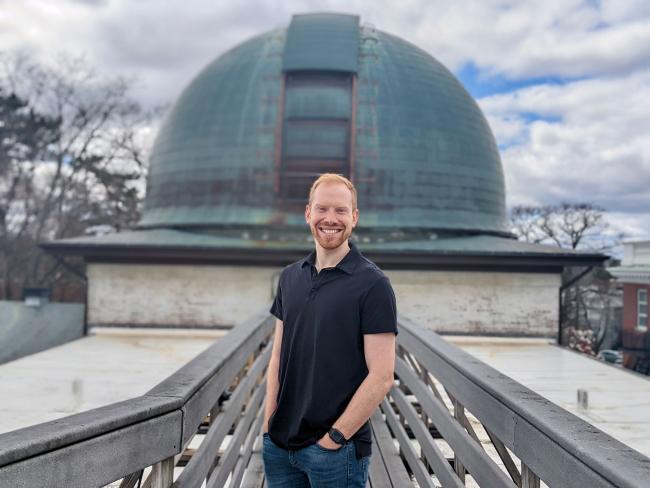The astrophysics student will assist the organization with education and science communication efforts.

Michael Foley stands in front of the CfA's historical telescope, the Great Refractor.
Astrophysics graduate student Michael Foley has been elected to the American Astronomical Society (AAS) Education Committee, becoming the first graduate student to serve on the committee since its formation in 1996.
The committee oversees all AAS educational activities, including implementing programs and resources for educators who are teaching astronomy and making recommendations for more effective strategies in astronomical education.
"I believe I add an important perspective to committee discussions around graduate education and science communication initiatives," says Foley whose term began in March 2022 and will run for three years.
Foley's immediate responsibilities are assisting with social media, the Education Committee blog and educational activities around upcoming solar eclipses. He also hopes to build deeper ties between the Education Committee and Astrobites, a student-run astronomy research blog that breaks down research papers into language accessible for undergraduates and the public.
"Science communication is very important to me because science is done for the betterment of everyone," Foley says. "Science is primarily funded by taxpayers; the public has a right to know where their money is going and how results will affect their lives. But more fundamentally, by working to communicate astronomy in engaging and accessible ways, we can inspire new ideas, excite people of all ages, and promote respect and awe for our place in the universe."
Michael Foley is a currently a fourth-year Harvard graduate student studying star formation and turbulence with astronomers Alyssa Goodman and Lars Hernquist. He is involved with astronomy education programs like Astrobites, ComSciCon and WorldWide Telescope.
Outside of astronomy, Foley serves as a mentor for high school and undergraduate students and as a STEM tutor for incarcerated individuals.
Foley holds a B.S. in physics and mathematics from the University of Notre Dame. He will earn a PhD in astrophysics from Harvard in May 2024.
Related News
New Grant Supports Teen Air Quality Studies
CfA Job Shadow Event Makes Astronomy More Accessible
To Navigate the Heavens, Take a Seat
Thousands of New Astronomical Images Highlighted in Latest Release of WorldWide Telescope
Astronomy Educators Awarded $2.8M to Inspire Minority Youth to Pursue STEM Careers
Projects
AstroAI
Factors Influencing College Success in STEM (FICS)
Massive Open Online Courses (MOOCs)
Misconception-Oriented Standards-based Assessment Resources for Teachers (MOSART)
Persistence in STEM (PRiSE)
Sensing the Dynamic Universe
SDU Website